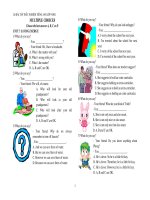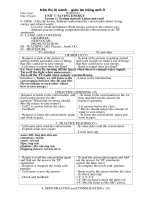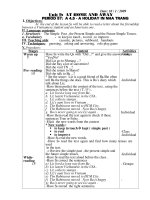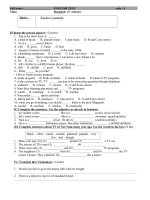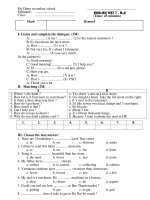UNT 7 : ENGLISH 9
Bạn đang xem bản rút gọn của tài liệu. Xem và tải ngay bản đầy đủ của tài liệu tại đây (115 KB, 12 trang )
trần thị tú oanh giáo án tiếng anh 9
Date of pre: Period:41
Date of teach: unit 7: saving energy
Lesson 1: Getting started+Listen and read
I- AIMS:- After the lesson, Students understand the conversation about saving
energy and related words.
- Use new vocab and phrases about energy-saving in the correct way.
- Students practice reading comprehension the conversation to do T/F
statements.
II - LANGUAGE CONTENTS:
- GRAMMAR:
- NEWVOCAB:
- PRONUNCIATION:
III - TEACHING AID: Pictures , book, CD ...
IV - PROCEDURE
T's activities S's activities
1.WARM UP (5')
- Request ss look at the picture in
getting started and make a list of things
that they could do to save energy.
- Call some ss report their list aloud
- Ss look at the picture in getting started
and work in pairs to make a list of things
that they could do to save energy.
- Some ss report their list aloud.
Ex: Save water by turning off the faucet when there is enough water supply.
Turn off the light when unnecessary.
Turn off the TV/radio when nobody watches/listens.
Introduce: ( Today, we will listen to the
conversation between Mrs Mi and Mrs
Ha are talking to each other about
how to save energy.)
- Listen to the introduction
2.PRACTICE LISTENING( 10')
-Request ss listen to the conversation and
find out the answer for this
question."What kind of energy should
Mrs Ha reduce to save money?
- Call 2 ss answer before the class.
- Feedback
- Request ss listen the conversation again
and work in pairs.
- Ss listen to the conversation in the 1st
time and find out the answer for
teacher's question.
2 ss answer before the class.
" Mrs ha should reduce the amount of
water to save money"
- Ss listen the conversation again and
work in pairs.
3, PRACTICE READING(15')
- Call some pairs read the conversation
- Explain some new vocab:
- Ss some pairs read the conversation
- Listen and copy
water bill: hoá đơn tiền nớc
enormous: to/lớn
crack: vết nứt
Pipe: ống nớc
plumber: thợ sửa ống nớc
Dripping faucet: vòi nớc bị rò
trÇn thÞ tó oanh – gi¸o ¸n tiÕng anh 9
- Reqest ss read the conversation again
and find out the answer for T/F
statements
- Request ss compare the result with
partners
- Call some ss give the answer
- Check and feedback
- Ss read the conversation again and find
out the answer for T/F statements
(corect the false ones)
- Ss compare the result with partners
- Some ss give the answer before the class
- Ss check and copy
1-T, 2-T, 5-T
3-F, Mrs ha hasn't check the pipes yet.
4-F, Mrs Ha listen to Mrs Mi's advice.
4, OPEN-PRACTICE and CONSOLIDATION ( 13')
- Request ss work in groups to practice
to use the word cue drill for advice
another to save energy.
1. turn off/ lights/ before/ leave/ room.
2. get a plumber/ make sure there/ no
cracks in the pipes.
3. repair dirpping faucets.
4. take/ shower/ in stead / have/ baths.
- Call some ss answer
- Feedback:
- Ss listen and work in groups to practice
to use the word cue drill for advice
another to save energy.
- Some ss answer before the class
- Listen and copy:
1. I suggest turning off the lights before leaving the room.
2. I suggest getting a plumber to make sure there are no cracks in the pipes.
3. I suggest repairing dripping faucets.
4. I suggest taking showers in stead of having baths.
5, HOMEWORK
Request 1, Learn by heart the new vocab.
2, Write a suggest for how to save energy with
electricity, gas, water...
listen and
copy
Date of pre: Period:42
Date of teach: unit 7: saving energy
Lesson 2: Speaking +listening
I- AIMS: Students further practice speaking to give a suggest ways to save energy.
II - LANGUAGE CONTENTS:
- GRAMMAR : I think we shoud....; I suggest + Ving....
- NEWVOCAB:
- PRONUNCIATION:
III - TEACHING AID: Pictures , Book, ...
IV - PROCEDURE
T's activities S's activities
1, WARM UP(5')
trÇn thÞ tó oanh – gi¸o ¸n tiÕng anh 9
- Request ss give the ways how to
make and respond to suggestions.
- Review some structures to make and
respond to suggestions.
- Ss give the ways how to make and
respond to suggestions.
Ex: I think you should turn off the faucet
before leaving.
I suggest turning off the light before
leaving.
- Listen and copy( page 58)
2, PRE-SPEAKING(7')
- Request ss look at the
pictures on page 59 and
then describe them.
- Ss look at the pictures on page 59 and then describe
them.
A. The faucet is on but nobody uses it.
B. Too much gas is use.
C. The fan is on, but nobody in the room.
D. The air conditiner is on, but nobody in the room.
E. The lights and TV are on, but nobody in the room.
F. The bath is overflowing.
G. They shouldn't go to work by motorbike.
H. They should go by bus.
3, WHILE-SPEAKING(10')
SPEAK a)
- Request ss use the expressions in the
table on page 58 to make suggestions
about how to save energy
- Call some ss report
- Ss use the expressions in the table on
page 58 to make suggestions about how
to save energy.
- Some ss report before the class.
Ex:
A. I think we should turn off the faucet before leaving.
B. I suggest turning down the gas.
C. I suggest turning off the fan when nobody use.
D. I suggest turning off the air conditioner when nobody use.
E. I think we should turn off the TV and the lights when nobody watch.
F. I think we should turn off the faucet before going to school.
G. I think we should go to work by bike.
H. I think we should go to school by bus.
SPEAK b)
- Request ss work in group of 4 to use the
eliciting in a) to make suggestions about
how to save energy as example on page
59.
- Call some groups to speak before the
class.
- Ss work in group of 4 to use the
eliciting in a) to make suggestions about
how to save energy as example on page
59.
- Some groups to speak before the class.
4, AFTER-SPEAKING(5')
- Request ss write a suggestion to save
energy at home.
Ex: I think we should turn off the TV
when we don't watch it.
- Ss write a suggestion to save energy
at home.
trÇn thÞ tó oanh – gi¸o ¸n tiÕng anh 9
- Introduce:( Today, you are going to
listen to the news on solar energy.
First we learn some new vocab.)
- Introduce some new vocab:
- Request ss look at a) on page 60 and
guess the statements are T or F
- Write the student's guess on board
- Lead: ( You are going to listen to
the news on solar energy. You listen
and decide whether the statements
are T or F. Then correct the F
statements.)
- Listen and copy
Solar: belong to the sun
Solar energy:energy as electricity received from
the sun
Nuclear power: power derived from nuclear
energy
Solar panels: devive as walls or doors for receive
solar radiation
advanced: ahead of time/high level
Roof: upper covering of a house
To install = to fix
To store : n¹p vµo
- Ss look at a) on page 60 and guess the
statements are T or F
- Listen to the lead
3.WHILE-LISTENING (15')
- Request ss listen to the part 4 on page 60 ,
2 or 3 times.
- Request ss compare the result with a
partners.
- Call some ss give answer what they have
heard before the class.
- Pause sentence by sentence to check, then
give correct answer
- Ss Listen to the part 4 on page 60 ,
2 or 3 times.
- Ss Compare the result with a
partners.
- Some ss answer
- Ss check and copy
1.T , 4.T
2.F : Most of our electricity comes from the use of coals, gas, oil, or nuclear power.
3.F : It's enough to provide power for total population.
5.F : in 2015
- Request ss read task b) carefully then listen
to the CD again and filling the gap with
missing words.
- Call some ss give their answer
- Feedback
- Ss read task b) carefully then listen
to the CD again and filling the gap
with missing words.
- Some ss answer before the class
- Ss listen and copy
1. effective , 2. pollution , 3. coutries , 4. store , 5. roof, 6. instead
6. HOMEWORK(3')
1. Write a suggestion how to save energy at home.
Date of pre: Period:43
Date of teach: unit 7: saving energy
Lesson 3: Listening
I- AIMS: - In the lesson, students listening to the news on solar energy.
trÇn thÞ tó oanh – gi¸o ¸n tiÕng anh 9
- Students practice listening skill to fill the missing infomations in the sentences and
answer T/F statements.
II - LANGUAGE CONTENTS:
- GRAMMAR :
- NEWVOCAB: Solar energy, Nuclear power, Solar panels, install...
- PRONUCIATION:
III - TEACHING AID: Pictures , book, CD ...
IV - PROCEDURE
T's activities S's activities
1.WARM UP( 5' )
-?:
Is the sun important to our life?
Can it provide us with energy?
Do you know how we can receive its
energy?
- Ss answer
Yes, it is
Yes, it can provide us with solar energy.
No, I don't know
2.PRE-LISTENING(10')
- Introduce:( Today, you are going to
listen to the news on solar energy.
First we learn some new vocab.)
- Introduce some new vocab:
- Request ss look at a) on page 60 and
guess the statements are T or F
- Write the student's guess on board
- Lead: ( You are going to listen to
the news on solar energy. You listen
and decide whether the statements
are T or F. Then correct the F
statements.)
- Listen and copy
Solar: belong to the sun
Solar energy:energy as electricity received from
the sun
Nuclear power: power derived from nuclear
energy
Solar panels: devive as walls or doors for receive
solar radiation
advanced: ahead of time/high level
Roof: upper covering of a house
To install = to fix
To store : n¹p vµo
- Ss look at a) on page 60 and guess the
statements are T or F
- Listen to the lead
3.WHILE-LISTENING (15')
- Request ss listen to the part 4 on page 60 ,
2 or 3 times.
- Request ss compare the result with a
partners.
- Call some ss give answer what they have
heard before the class.
- Pause sentence by sentence to check, then
give correct answer
- Ss Listen to the part 4 on page 60 ,
2 or 3 times.
- Ss Compare the result with a
partners.
- Some ss answer
- Ss check and copy
1.T , 4.T
2.F : Most of our electricity comes from the use of coals, gas, oil, or nuclear power.
3.F : It's enough to provide power for total population.
5.F : in 2015
